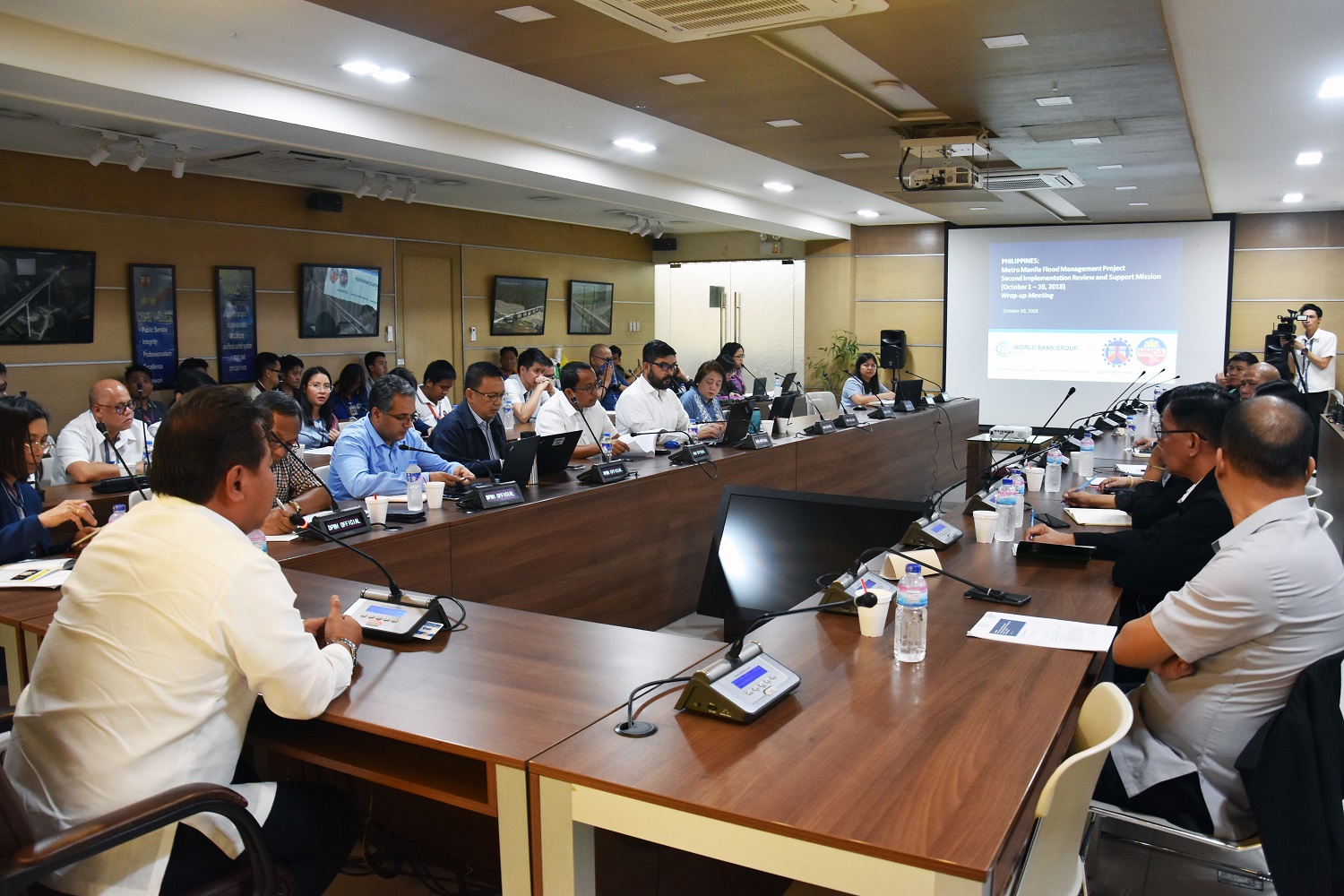
The Department of Public Works and Highways (DPWH) and Metropolitan Manila Development Authority (MMDA) completed on Wednesday, October 10, 2018 its second implementation review and support mission on the World Bank and Asian Infrastructure Investment Bank-assisted Metro Manila Flood Management Project.
Officials and representatives from World Bank, Asian Infrastructure Investment Bank, National Housing Authority, Social Housing Finance Corporation Department of Finance, National Economic and Development Authority, Manila and Pasay City local government units (LGUs) participated in series of meetings and site visits from October 1, 2018 for nine (9) days with DPWH and (MMDA) to finalize plans in expediting the implementation of the components of the project that aims to modernize and improve drainage capacity of Metro Manila by rehabilitating and modernizing 36 old pumping stations, constructing new 20 pumping stations; minimizing solid waste in waterways; and prioritizing housing and resettlement of informal settler families living along waterways.
On behalf of DPWH Secretary Mark A. Villar, DPWH Undersecretary for Unified Project Management Office (UPMO) Operations and Technical Services Emil K. Sadain who presided over the wrap-up meeting said procurement activities for Batch 1 of Metro Manila Flood Management Project Phase 1 covering the rehabilitation and modernization of five (5) old pumping stations is being rushed to facilitate commencement of civil works.
The bidding of Balut Pumping Station in Tondo, Manila in particular was held last September 2018, while the Vitas Pumping Station in Tondo, Manila; Paco Pumping Station in Paco, Manila; Tripa de Gallina Pumping Station in Pasay City; and Labasan Pumping Station in Taguig City are slated for International Competitive Bidding from October to November this year.
Procurement of Operation and Maintenance (O&M) of equipment for the pumping stations and waterways is also targeted to start by the second week of November 2018.
MMDA on the other hand reported the establishment of an MMDA-Project Management Office (PMO) and a Special Bids and Awards Committee (SBAC) to focus on procurement activities of equipment and fast-track solid waste collection and large-scale metro-wide information, education and communication campaign to minimize solid waste in waterways.
Undersecretary Sadain added that initial assessment is also being carried out for the projects to be implemented in the subsequent years by the DPWH UPMO-Flood Control Management Cluster such as Batch 2 of the rehabilitation of existing pumping stations covering the seven (7) stations of Balete-Ermita; Escolta; Sta. Clara; Libertad; Makati; Abucay; and San Andres Pumping Stations in 2019 to 2020. New pumping stations of Cutcut and Romualdez will also be constructed during this period.
In 2020, DPWH will construct six (6) additional pumping stations namely: Maytunas; Buhangin; Casili; Ilugin River; Isla; and Damayang Lagi, and rehabilitate eight (8) pumping stations namely: Santibañez, Tapayan; Taguig; Hagonoy; Hulong Duhat; Magsaysay; Herrera; and Concepcion.
For Batch 3, DPWH will construct six (6) additional pumping stations namely: Maytunas; Buhangin; Casili; Ilugin River; Isla; and Damayang Lagi, and rehab seven eight (8) pumping stations namely: Santibañez, Tapayan; Taguig; Hagonoy; Hulong Duhat; Magsaysay; Herrera; and Concepcion.
By year 2021 on the fourth year of the project, six (6) new pumping stations will constructed namely Del Monte; Doña Imelda; Kalusugan; Mariblo; Masambong; Matalahib-Talayan, and modernization of Balot; Merville-Dampalit; Tanza; Niugan; Artex; Muzon; Acacia; Roque.
DPWH will then start on fifth year or by 2022 the construction of new Progreso; Roxas; Sobrepena; Sta. Cruz; Talayan; and Tatalon Pumping Stations; and the rehabilitation and modernization of Aviles-Uliuli; Beata; Binondo-Escolta; Pandacan; Quiapo; San Agustin; Uli Uli; and Valencia Pumping Station.
The whole Metro Manila Flood Management Project – Phase I which will need an allocation of P23.5 Billion is jointly funded by the Philippine government, World Bank and Asian Infrastructure Investment Bank. Both World Bank and Asian Infrastructure Investment Bank are lending P19.515 Billion each or 41.5 percent of the project’s total budget while the Philippine Government is spending P3.985 Billion or 17 percent for the project.
